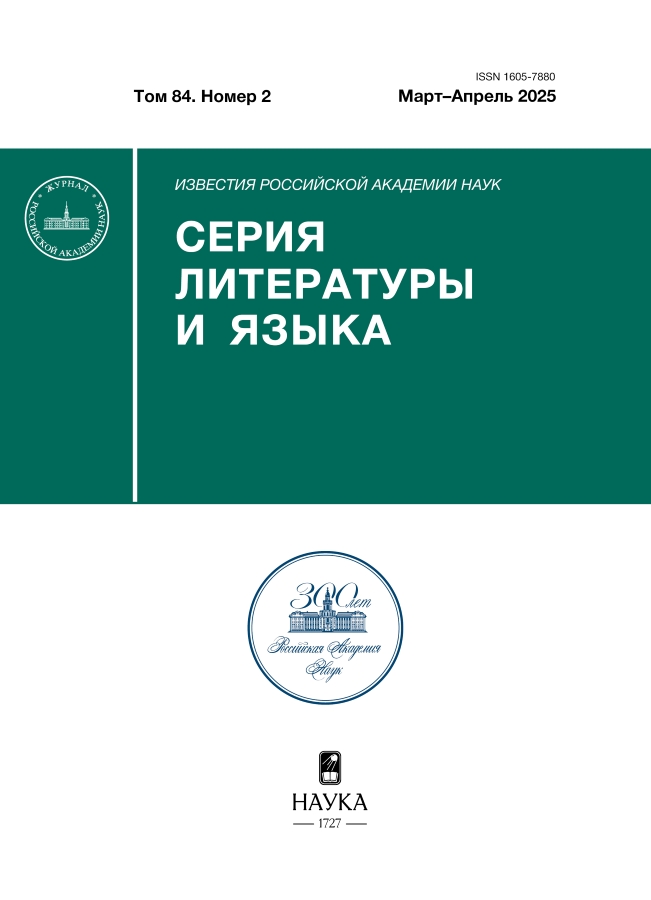The phenomenon of the character in Chekhovʼs plays
- Authors: Afanasyev E.S.1
-
Affiliations:
- K.D. Ushinsky Yaroslavl State Pedagogical University
- Issue: Vol 84, No 2 (2025)
- Pages: 51-60
- Section: Articles
- URL: https://ruspoj.com/1605-7880/article/view/684273
- DOI: https://doi.org/10.31857/S1605788025020058
- ID: 684273
Cite item
Abstract
The article examines the phenomenon of the character in Chekhovʼs dramatic works, which seems to be an analogue of the character in his fiction. It is analogous in the sense that the character in Chekhovʼs dramatic works has the same ontological and aesthetic statuses as the character in the works of his fiction. That character is characterized by the same mode of existence: he has the same tendency to replace real being with a fictitious one, as a result of which he experiences the same internal crises (dramatic guilt), but ultimately, through life experience, he finds his true self. The very concept of “guilt” of a character in the conditions of his dependence on objective factors is largely formalized. And in Chekhovʼs dramatic works there is a plot of “the history of the human soul”, embodied, however, in many plot lines, each of which has the same structure; namely, a dramatic plan and an epic plan, with the leading role of the latter. This structure of the plot of Chekhovʼs plays determined the specifics of their composition and genre specificity (ironic drama). In effect, the aesthetic status of the character in Chekhovʼs works is that of an ironic hero.
Full Text
About the authors
Edgard S. Afanasyev
K.D. Ushinsky Yaroslavl State Pedagogical University
Author for correspondence.
Email: edg_afanasyev@mail.ru
Doct. Sci. (Philol.), Professor
Russian Federation, 66 Kotoroslnaya Embankment, Yaroslavl, 150000References
- Tolstoy, L.N. Sobranie sochineniy: V 22 t. [Collected Works in 22 Vols.] Moscow: Khudozhestvennaya literatura Publ., 1978–1985. Vol. 15. 431 p. (In Russ.)
- Semanova, M.L. Chekhov – khudozhnik [Chekhov the Artist]. Moscow: Prosveschenie Publ., 1976. 223 p. (In Russ.)
- Shach-Azizova, T.K. Chekhov i zapadnoevropeyskaya drama ego vremeni [Chekhov and the Western European Drama of His Time]. Moscow: Nauka Publ., 1966. 150 p. (In Russ.)
- Viduetskaya, I.P. Sposoby sozdaniya illjuzii realnosti v proze zrelogo Chekhova [Ways to Create the Illusion of Reality in the Prose of a Mature Chekhov]. A.P. Chekhov: Pro et Contra. Antologiya [A.P. Chekhov: Pro et Contra. Anthology]. Vol. 3. St. Petersburg: Izd-vo Russkoy christianskoy gumanitarnoy akademii Publ., 2016. 879 p. (In Russ.)
- Regotsi, I. Text Chova kak text zisni [Chekhovʼs Text as the Text of Life]. Voprosy literatury [Topics in the Study of Literature]. 2021, No. 5, pp. 88–108. (In Russ.)
- Markovich, V.M. Tsit. po statje V.A. Kotelnikova “O realizme i idealizme v literature i filosofii” [Quoted from the article by V.A. Kotelnikov “On Realism and Idealism in Literature and Philosophy”]. Russkaya literature [Russian Literature]. 2009, No. 2, pp. 3–30. (In Russ.)
- Todorov, Tz. Poetika [Poetics]. Strukturalizm: “za” i “protiv”: Sb. St. [Structuralism: pro et contra. Collected Articles]. Moscow: Progress Publ., 1975. 468 p. (In Russ.)
- Michailov, I.I. Eksistentialnaya filosofiya A.P. Chechova [The Existential Philosophy of A.P. Chekhov]. Russkaya filosofiya XX veka: Natsionalnye osobennosti, techeniya i shkoly, politicheskie sudby [Russian Philosophy of the 20th Century: National Peculiarities, Trends and Schools, Political Destinies]. Ekaterinburg: Isd-vo Uralskogo universiteta Publ., 2000. 226 p. (In Russ.)
- Ginetsinskiy, V.I. Existentsialno-psichologicheskie intentsii chudozestvennogo mira A.P. Chekhova [Existential and Psychological Intentions of the Artistic World of A.P. Chekhov]. Vestnik S.-Peterburdskogo universiteta. Nauchno-teoreticheskiy zurnal. Seriya 12. Psichologiya. Sotsiologiya. Pedagika [Bulletin of the St. Petersburg University. Scientific and Theoretical Journal. Episode 12. Psychology. Sociology. Pedagogy]. St. Petersburg, 2010. Vol. 2. 440 p. (In Russ.)
- Shestov, L. Tvorchestvo iz nichego [Creativity from Nothing]. St. Petersburg, 1906. 54 p. (In Russ.)
- Byaly, G.A. Dramaturgiya A.P. Chekhova [The Drama of A.P. Chekhov]. Istoriya russkoi dramaturgii XIX – vtoroi poloviny XX veka do 1917 goda [The History of Russian Drama. The Second Half of the 19th – Early 20th Century Until 1917]. Leningrad: Nauka Publ., 1987. 659 p. (In Russ.)
- Golomb, A. Charakteristiki Chekhova: realisuya stoletniy potentsial [Chekhovʼs Characteristics: Realizing the Century-Old Potential]. Ibsen. Strindberg. Chekhov. Sb. St. [Ibsen. Strindberg. Chekhov. Collected Articles]. Moscow: Rossiyskiy gosudarstvenny gumanitarny Universitet Publ., 2007. 402 p. (In Russ.)
- Shetstov, L. Tsit. po statje A.D. Stepanova “Lev Shestov o Chekhove” [Cit. according to the article by A.D. Stepanov “Lev Shestov on Chekhov”]. Chekhoviana. Chekhov i Serebryany vek [Chekhovʼs Studies. Chekhov and the Silver Age]. Moscow: Nauka Publ., 1996, pp. 75–79. (In Russ.)
- Chekhov, A.P. Poln. Sobr. Soch. i picem: V 30 t. [Completed Works and Letters: in 30 Vols.]. Moscow: Nauka Publ., 1986. Sochinenija: V 18 t. [Works in 18 Vols.]. Vol. 13. (In Russ.)
Supplementary files










